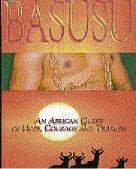
Title: BASUSU
An African Quest of Hope, Courage and Triumph
Author: George S. Peart
Publisher: Derek Press
Reviewer: Barbara Nelson
BASUSU is an imaginary story of the amazing life of the grandson of Chief Mensa, who is a leader of the Ashanti tribe in the quiet village of Odu, located several miles inland from the coastline in West Africa.
The young teenage boy is captured by strange white-skinned men who wore "clothing that covered their bodies", had hats on their heads and carried strange sticks that were hollow at the end. He is carried away "to a big house" on the sea.
Crowded together with other captives in the hold of a ship where the air stank of vomit and human waste and the smell of bilge water, Basusu nevertheless survives the voyage. He is finally taken off the ship at St Simon Island in North America.
A new life begins for him in a strange new world where he becomes a slave, picking cotton "day in and day out" on the Jordan plantation near Brunswick, Georgia. At night he sleeps in a small dilapidated cabin with several other male slaves.
Basusu meets Chati, a girl who was born into slavery and, along with her mother, Sally, was a house slave in the Jordans' big house. Through her influence he attends a chapel service where Reverend Stockport, "a short, balding African" preached. Basusu is very impressed with the words of the preacher: "Wid God notin' is impossible." He retains those words in his heart.
After this initial introduction to spiritual things Basusu began to rely exclusively on "the God of the Sunday chapel services" and his faith grew.
The author of Basusu, Dr George Peart, was born in Clark's Town, Trelawny. He immigrated to England in 1960 and later served as pastor to three congregations prior to 1974. He received an MA in sociology from Middle Tennessee State University, USA, in 1981 and a Doctor of Divinity from the European Theological Seminary in 1998.
In the story Basusu was often troubled and depressed at the lack of African traditions in "the strange land", but he prayed through the difficulties. Eventually he married Chati and his work was changed from cotton picker to yard hand, so that he could live with her in the slave quarters in the big house.
Basusu and Chati had four children, three boys and one girl, who were allowed to play and interact with the slave owner's children. They were very fortunate as many other slaves had their young children taken away, sold or traded to other plantation owners.
As time passed Basusu began to have dreams about his children being free and educated, although it was against the law for slaves to read and write. He did not like the idea of his children going to work in the fields, as he had to. Although his mother-in-law Sally scoffed at his lofty ideas he stayed strong and told her: "I got da Lawd's faith."
The Jordan's children were soon preparing to travel to Boston to attend college and Basusu's children were to accompany them as servants. While in Boston, however, they met a man, Joel Brown, whose mission was to help slaves living in the southern states to escape to the north.
Basusu's family was able to escape to Philadelphia where the children began their education, and their parents Basusu and Chati were employed with a pleasant, caring family.
In the south fighting between Union and Confederate forces became widespread. By 1868 the Jordan plantation was completely destroyed. Basusu's children, meanwhile, had begun and completed school.
Peart traces the peculiar circumstances that bring about a meeting of the slave owner Bill Jordan, his wife and children and the former slaves' families after seven years.
Basusu's son Samuel, destined to work as a slave in the cotton fields of the south, was used in a miraculous turn of events to save the former slave owner's life.
But even then Basusu suffers fear and emotional trauma. "I don't know dat Mistah Jordan will be happy to see us. I know how dat man is, how he make people do, an' feel ...." he confides in his daughter Jenny.
She replies to her father and calms his fears: "God just tol' me to remin' you dat it's okay, dat He's watchin' out for you. You'll be brave when it's time, and Mistah Jordan will be okay. Don' worry about it."

